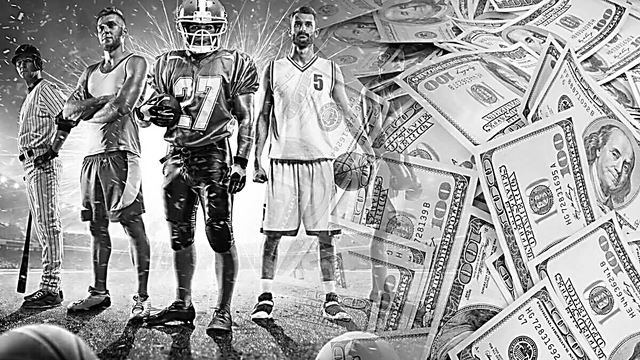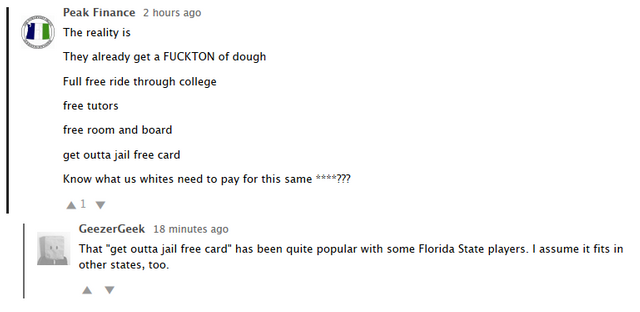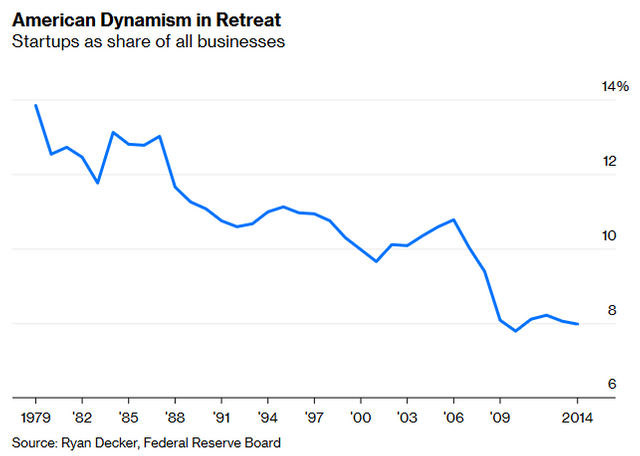NCAA Approves Olympic Model, Richard Burr Starts Generational War

The NCAA Board of Governors approved unanimously to permit students participating in athletics the opportunity to benefit from the use of their name, image and likeness in a manner consistent with the collegiate model.
Remember the NCAA Football and NCAA March Madness video game series that were discontinued? Now, there is an opening for a return to those popular video games as the NCAA faced pressure from the State of California and State of Florida to allow student-athletes to be compensated for their own personal brands. This is a massive change that allows student-athletes to be like the rest of the student body and not have limitations on what they can earn and how they can earn it. Changes will be put into effect possibly as early as the 2020-21 School Year, but the real impacts should be felt in 2021-22.
The days of a student-athlete having to go hungry, worry about their family's income insecurity, concerns that their collegiate fame in athletics may not result in financial compensation as a professional athlete, and the annoyance and opportunity costs of requiring multiple compliance approvals (that almost never are approved) to be an entrepreneur as a student-athlete are apparently over in the near-future. This is a massive step forward and the universities do not have to spend a dime to do it.
There are unhappy fans who have been arguing for student-athletes to get nothing and be happy about it for decades. They have responded to this news and sure it is a bit slanted, but these are common arguments.



College Athletics will be in a Fiscal Bind in the 2020s: The Olympic Model is the Most Elegant Solution
Remember when Clemson University had furloughs? It seems so long ago, but Clemson University and Clemson Athletics was in a terrible financial state in 2009. Clemson Athletics employees were required to take five furlough days, which included both then Clemson Men's Basketball Head Coach Oliver Purnell and Clemson Football Head Coach Dabo Swinney. Clemson signed the Clemson Football staff to new larger contracts, but were keenly aware that they were on the razor's edge with the economy. The economic conditions did recover and everyone involved in College Athletics went on a spending spree to pay for new facilities, amenities, parking lots, and much more to meet the demand that they thought would be inelastic and continue for decades to come. The supply met demand during the middle 2010s, but as the next decade approaches, there are perils to come that will completely alter college athletics and the whole educational model.
The Immediate Death Knell is Still Possible
The immediate end of college sports is when the universities are mandated to compensate student-athletes directly as many of the Athletic Departments are already operating at a loss and then there is the complex matter of Title IX intersecting with an employment situation. This day is not coming yet, but any sort of mandates can happen in 2025 as this is expected to be a year of massive change in the United States. Here is some free advice for those who do not understand what is to come (not an advertisement nor an endorsement, it is just a starting point of written content to sample for informational purposes) and it is not certainly not the below.
Smaller Schools are Already Downsizing
With most athletic departments operating at a loss, some schools have cut individual sports or have chosen to downgrade divisions. Here are a few notable examples.
- The University at Buffalo (UB) cut four sports programs in 2017.
- The University of Connecticut is leaving The American to go Independent in Football and join the Big East.
- Eastern Michigan University cut four sports programs in 2018.
- The University of Idaho shifted from Division I FBS to Division I FCS in 2016.
College Football Attendance and Television Ratings are Down
College Football is the big revenue generator for almost every school. It is the sport that often subsidizes the rest and if Football sneezes, the rest of the sports offered by a particular school have a bad case of pneumonia. The expectation that the demand for College Football, especially in the SEC, was inelastic. Inelastic demand means that athletic programs can charge whatever they wanted for tickets and expect fan and alumni bases to meet revenue expectations every fiscal year.
College Football stadiums have expanded and video boards have grown as well. Athletic spending on new weight rooms, bathrooms, concourses, lazy rivers, and upper deck seating has intensified.
However, ticket sales for College Football is at a 22 year low. The tone-deaf responses have been to blame Generation Z and Millennials because of their phones, love of vaping, limited attention spans, self-medicating, narcissism, anxiety, and extreme histrionics. The truth is that the "Boomers" overbuilt the stadiums and the models were wrong just like how this same generation did not see that the dot-com bubble would burst, the inevitable 1987 Market Crash would happen, and the Great Recession was certainly impossible since residential home values could never decrease. The same generation and mindset of a generation that produced leaders who thought oil prices would steadily increase and based a state budget on it, somewhat like Venezuela except without the fraudulent election, repression, forced command economy (nationalization of industries), inflation (and failed cryptocurrency) and formerly upper-middle class people resorting to selling hair and eating flamingos. Assumptions are a tricky thing and the unsubstantiated ones are exposed in the age of Big Data. It's easy to pick on the young just as it is easy to pick at the mistakes of an older generation that squandered so much. Needless to say, this is the wrong way to invite a generation to attend or watch a sport that is on borrowed time.
The Decline of Youth Football
It is a case of affluence meeting the reality of a dangerous sport. Do not let the meatheads and compensated mothers fool you, Football is a collision sport. It is the closest thing to combat on domestic soil without serving in the military, as a paid mercenary or in law enforcement. The trend across the country is clear and it is starting in the affluent suburbs of the so-called "Blue States" and it will creep its way into the purplish suburbs of Atlanta, Nashville, Orlando, Austin, and Charlotte.
A survey of 1,025 parents in a University of Washington School of Medicine survey found that 61% of parents supported a ban on youth tackle Football. 83% of parents thought over 10 of 100 athletes suffered a concussion per year and 25% thought over 50 out of 100 athletes were affected. Concussions are not what causes Chronic Traumatic Encephalopathy (CTE), but rather CTE is brought on microconcussions. New rules have not changed nor prevented the undesired outcome.
Youth Football has seen a decline in participation of 6.5% from its peak. High School Football was once an institution and now teams have folded in the Commonwealth of Virginia. It is not just deep blue Northern Virginia suburbs that are a part of the Washington D.C. elite, these trends are being felt in the suburbs of the former Capital of the Confederate States of America, Richmond.
"The football season here in Fairfax County is alive and well. But that’s not true everywhere in Virginia. In Charles City County, near Richmond, the high school started practice this year with 16 players. Over the course of the first week of practice that dropped to eight players. By the second week it was one or two players. Superintendent David Gaston had to cancel the season."It is not that young men are "weaker" or even shying away from contact sports, but rather they are choosing more aspirational sports for the well-heeled and new preferences exist. A major beneficiary of the new shift of sports preferences is lacrosse as the Northeastern diaspora across the country has made its impact. Football started as a Northeastern elite game and it is slowly shifting into a Deep South sport after enjoying its run as the sport of the masses.
It is getting tougher to insure Football as it is deemed as being "too high of a risk"
Education in the United States is changing
The factory model of educating children and the few adults that still exist in the 21st century is starting to fade away. A school is becoming no longer a physical place, much like how the workplace is changing (telecommuting, distributed teams, and the gradual reduction in vertically integrating back office functions) and not everyone likes these changes. There are parties with much to lose due to technological innovation and the growing desire for leaner and more organic organizational structure.
Who loses in these changing times? Who is fighting to uphold the status quo?
- Public unions and their members. Due to the graying of the U.S. population, teachers are going to be "excessed" in the 2020s, it will not be a completely nationwide phenomena in terms of severity. Virtual schools are starting to replace brick-and-mortar schools in some regions and some public school buildings have already been sold because people are having less children or are living child-free. These unions will fight to stymie technological progress, but technology and demography are destiny.
- Local businesses in college towns. For most areas of study, the virtual classroom experience significantly reduces the residential and physical function of the university. These reductions result in local businesses losing revenue due to a radical reduction in students on-campus. The idea of the college town becomes a thing of the past.
- Real Estate Developers and Construction Firms. Less people and faculty in the college town means less demand to build new buildings on-campus, build new commercial and residential facilities off-campus, and those lazy rivers are a thing of the past.
- Student Loan Providers. Guaranteed federal loan money fueled the skyrocketing costs of colleges and universities at both the public and private institutions. Technology ushers in an age where colleges and universities must provide competitive pricing. Education is now a commodity rather than an accomplishment.
- The College Athletics racket. Athletic Directors, coaches, agents, politicians, interlinked businesses, and media all have a lot to lose in a Massive open online course (MOOC) world.
- High School Coaches. The bar to becoming a High School Coach is quite low, but what happens to High School Coaches who have less adolescents to coach because of the population bust and virtual schools? They have to coach at private, niche preparatory schools like IMG Academy or follow the business model of piano teachers, self-defense instructors, and MMA trainers.

Less students on campus, less school spirit, a scattered student and alumni base, less cultural indoctrination, and less money coming into the coffers of the Athletic Departments is the future. Something has to give and downsizing must occur. This is not conducive to universities actually paying student-athletes like they are employees.
Senator Richard Burr Fights the Culture War and Forgets He is a Swing State Senator
Senator Richard Burr (R-NC) is not helping with the 2020 Presidential Election in his own state during his self-imposed final term in office. North Carolina has experienced transplant gentrification and modernization of Charlotte, Asheville, and Raleigh. North Carolina has shifted from a reliable "Red State" to a swing state that is capable of electing a Democratic Party President, Governor, and Senator.

If college athletes are going to make money off their likenesses while in school, their scholarships should be treated like income. I’ll be introducing legislation that subjects scholarships given to athletes who choose to “cash in” to income taxes. https://t.co/H7jXC0dNls
— Richard Burr (@SenatorBurr) October 29, 2019
This type of messaging would be followed by this ad.
But wait there's more...
Still more...
Those under the age of 30 and hold views right-of-center, this is the type of stuff that should make you cringe and worry about the future. A Democrat who wants to win in 2020 cringes when they see this.
We live in an age of negative partisanship and the passion is most felt by the young, the digitally connected, and the left-wing not just in the United States, but around the world. People have long memories (and opposition research knows no bounds) and in a more youthful state like North Carolina that has 15 Electoral Votes in play, Burr did no favors for President Donald Trump much like Beto O'Rourke did no favors for himself, any of the Democratic Party nominees or any Democratic Party politician in the State of Texas.
Every party member, voice or perceived representative on the two warring sides in the Cultural Civil War that grips the United States is fodder to scare an entrenched voting bloc. Clown World vs. The Handmaid's Tale, which dystopia are you trying to avoid?
Richard Burr's party membership should not matter, but his behavior in response to this change by the NCAA and the language he used is emblematic of the stereotypes that Millennials and Generation Z have of the Republican Party. It will be used against the party much like how Beto O'Rourke's firearms confiscation proposal will be used by right-wing outlets on older generations and rural Americans.
Richard Burr was rightfully panned Left...
Billionaire's son inherits $100 million despite doing no work to earn it.
Richard Burr: That shouldn't be taxed.Black athlete gets a scholarship based on his own talent, seeks an endorsement deal so he can afford to buy food.
Richard Burr: HERE COMES THE TAX MAN MOTHERFUCKER https://t.co/BVrty2DpZZ
— Matthew Chapman (@fawfulfan) October 30, 2019
Right...
Burr doubles down on the worst possible position: Senator Wants NCAA Athletes Treated Differently From Any Other Student Making Income From Use Of Likeness https://t.co/9XwYvhEDe3
— Ben Domenech (@bdomenech) October 30, 2019
and Center...
You are the worst, Burr. https://t.co/aG7zvUJPNh
— Philip DeFranco (@PhillyD) October 29, 2019
These three individuals commenting on Burr's tweet and action item were all born after the year 1980 and they have completely different views of the world that come into direct conflict, but yet there's a unity much like the way people came together to censure Blizzard, Lebron James, James Harden, Adam Silver and the NBA for kowtowing to the Chinese Communist Party who are trying to erode the freedoms of the people in Hong Kong and committing genocide in Western China.
There is a younger generation that sees a completely different world from the limited and insulting caricature that the older and crustier generation sees on Fox News or listens to on failing terrestrial radio outlets (talk radio); a generation that is confronting the aftermath of Gamergate, dealing with issues concerning free expression, and has a recognition of the real challenges in the economic landscape. Rather than chastising their grandkids, they should be understanding what issues make them tick. The world is not Twitter, but people like Richard Burr also need to take a bit of lesson from what Bill Maher has to say here.
Let your Senator know that Richard Burr's bill should not make it out of a committee vote. Free enterprise and entrepreneurship are too important in an age where new business formation rates are at all-time lows.
